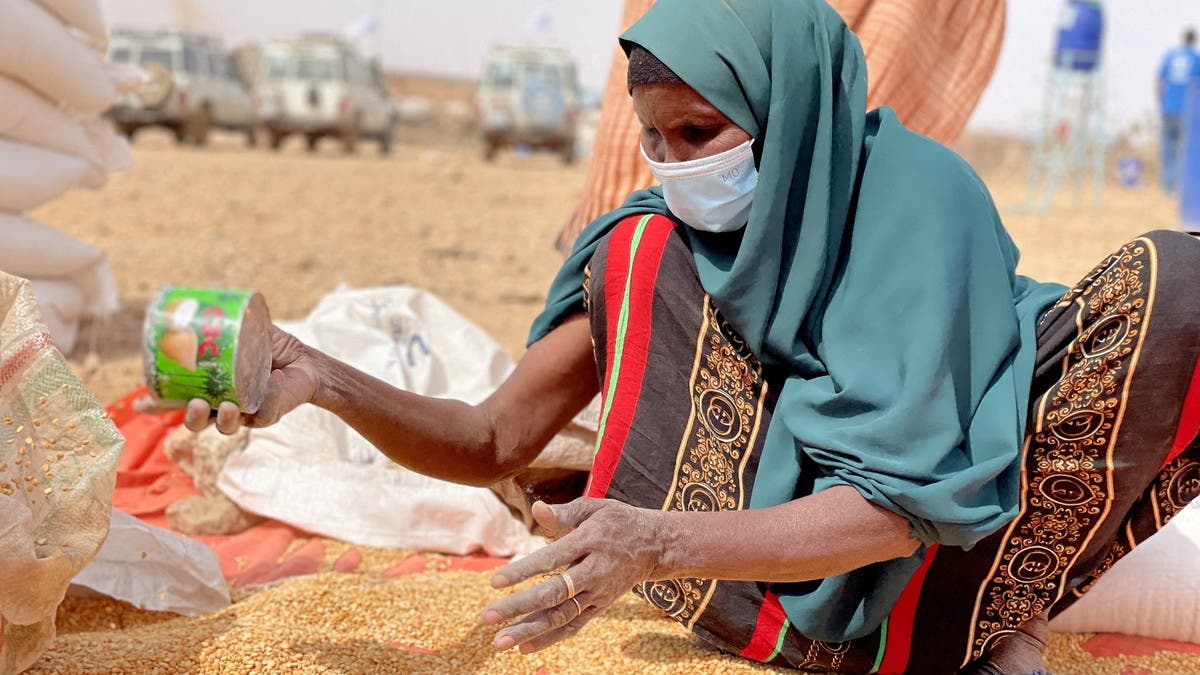Food security was already “deteriorating” in many countries before the Ukraine war, but has since worsened, an expert from the United Nations’ Food and Agriculture Organization (FAO) told Al Arabiya English, adding that all countries will eventually feel the impact of higher food prices.
“Food security outcomes in many countries were deteriorating well before the war started, as the COVID-19 pandemic impacted livelihoods, and food prices were already high,” FAO Economist Monika Tothova told Al Arabiya English.
For all the latest headlines follow our Google News channel online or via the app.
“However, the war in Ukraine restricted exports, and added additional uncertainty to the markets putting an upward pressure on prices. Shipping costs also increased.”
Ukraine, often referred to as the world’s breadbasket, was invaded by Russia on February 24 in what Moscow calls a “special military operation.”
Since then, countries across the world have imposed tough sanctions on Russia, restricting global trade, as the conflict rages on and heavily disrupts the Ukrainian economy.
The war has fueled a global food crisis, with surging prices for cooking oils, grains, fuel, and fertilizer.
Russia and Ukraine account for nearly a third of global wheat supplies, while Russia is also a key fertilizer exporter and Ukraine a major corn and sunflower oil supplier.
However, Tothova noted that international food prices were already high prior to the Russian invasion, attributing this rise to “market supply and demand conditions” and high energy and fertilizer prices, among “other agricultural inputs.”
“Against this background, the escalation of conflict engaging such important global agricultural commodity market players, at a time of already high and volatile international food and input prices, brought significant concerns over the war’s potential negative impact on food security, both domestically and internationally, especially for low-income food import dependent countries and vulnerable population groups across the globe.”
In 2021 alone, conflict – in combination with economic shocks – affected around 139 million people worldwide. Since the war’s onset earlier this year, this figure is likely to be much higher.
According to a report released by the FAO and the World Food Program last week, acute food insecurity is likely to worsen in 20 countries between June and September this year. Countries included in the joint report that were at risk of food insecurity included: the Democratic Republic of the Congo, Nigeria, Yemen, Afghanistan, Ethiopia (mostly Tigray), Syria, South Sudan, Somalia, Sudan, Haiti, Niger, Kenya, Burkina Faso, Lebanon, Chad, Mali, Angola, Mozambique, Guinea, Madagascar, Mauritania, Benin, and Cabo Verde.
These countries, some of which are referred to by the UN organizations as hunger hotspots, are facing food security issues for varied reasons, some of which include natural disasters, conflict, and economic crises.
The WFP predicted that between 179 million and 181 million people will be in crisis or worse when it comes to food security, a staggering increase from the 139 million already affected in 2021, which accounted for an increase of 40 million people since 2020.
When asked about the state of food security in the Middle East and North Africa region, Tothova said that all countries would be affected by higher food prices, although some might be in a “better position” to deal with it.
“The region is very heterogeneous in many aspects: endowments in terms of land, water, as well as natural resources, economic conditions, climatic conditions… In the entire region – with the exception of a few, such as those in Gulf, agricultural production is important and provides livelihoods to many, but all countries in the region are cereal importers. They are significant importers of wheat, rice, vegetable oils but also feed grains,” she said.
“Countries which are exporting energy commodities, such as Algeria, Iraq, Qatar, Saudi Arabia are in a better financial position and able to fund increased cost of food imports.”
On the other hand, Syria, Yemen, Somalia and Sudan are experiencing very high levels of food insecurity due to conflict, “weather shocks,” and “deteriorating macroeconomic conditions.”
Tothova said that Yemen, which has been “the center of one of the world’s biggest humanitarian crises,” has around 17.4 million people who are now in need of food aid.
“The humanitarian situation in the country is likely to get even worse between June and December 2022, with the number of people who likely will be unable to meet their minimum food needs in Yemen possibly reaching a record 19 million people in that period.
“At the same time, an additional 1.6 million people in the country are expected to fall into emergency levels of hunger, taking the total to 7.3 million people by the end of the year.”
Lebanon’s “prolonged economic crisis and lack of storage facilities in the main [Beirut] port following the 2020 explosion” has affected its ability to import food, she said.
“[Lebanon’s] economic crisis also constrained employment opportunities, and high levels of currency devaluation decreased the purchasing [power].”
Elsewhere in the region, food security outcomes are not expected to be as extreme, but people are likely to begin to spend more on food and energy, leaving them with less money to spend on other items.
“Even people who are not yet in emergency levels of food insecurity are likely to be affected as their purchasing power will decrease, they will need to turn into less nutritious foods or skip meals, withdraw kids from school… all sorts of negative coping strategies will impact their health and wellbeing, including increasing prevalence of undernourishment, as well as wasting and stunting of children.”
Read more;
Lebanon recovery hopes hinge on IMF bailout as Ukraine war, inflation bite: Economist
IMF likely to cut global growth estimate as conditions deteriorate: Official
Inflation to staycation: UAE expatriates staying put for the summer, hotels cash in

 World3 years ago
World3 years ago
 World3 years ago
World3 years ago
 Business11 months ago
Business11 months ago
 Entertainment7 years ago
Entertainment7 years ago
 World7 years ago
World7 years ago
 Entertainment7 years ago
Entertainment7 years ago






